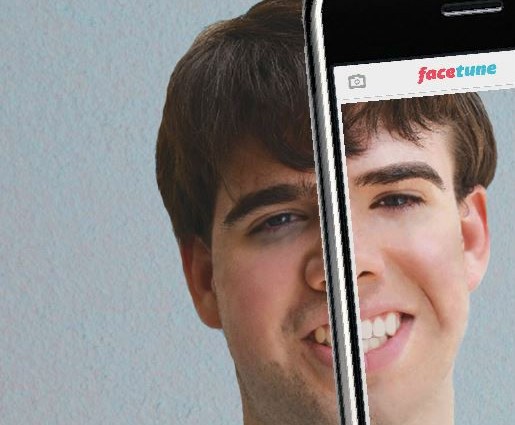Gigi* ’15 punches in her iTunes password, charging $3.99 to her father’s credit card so that she can use and abuse the new app which everyone is talking about – Facetune, which is like Auto-tune for your face.
The App Store describes Facetune as an opportunity “to look your Hollywood best” in photos taken on a mobile phone.
The app allows users to alter their bodies, whether it’s digitally slimming their thighs, shrinking their noses or blurring their blemishes.
“I would make myself skinnier, [narrow] the sides of my legs,” Gigi said. “I would smooth my skin if I had a pimple or two. I used to edit my nose before I got it done. I used to edit my jaw line sometimes, and I would definitely [narrow] my hips because I always felt insecure about them.”
Director of Counseling and Psychological Services Kavita Ajmere disapproves of apps like Facetune and says that they can distort a student’s perspective.
“They are so hyper-focused on what they’re going to look like, but they forget about the part two of that conversation, the ‘what if these people actually see me in person,’” Ajmere said. “I don’t like that. I don’t think they’re thinking about the reality of it.”
In 2011, the American Medical Association enacted a new policy to encourage advertising organizations to work with companies and experts concerned with child and adolescent health to develop guidelines for their ads. The AMA hoped that children viewing these ads would be less inclined to edit their own photos if what they saw on television or magazines was not edited as well.
Mikayla* 15 alters photos via Facetune to follow the example that has been set by celebrities. She says that when she logs into her Instagram account and sees celebrities looking stick-thin and airbrushed, she can’t help but feel she needs to do the same.
“I’m not embarrassed,” Mikayla said. “I know that every other girl does it too. I feel like given the pressures of society and the press, everything is airbrushed for celebrities.”
John* ’15 is aware of the Facetune phenomenon going on among young girls and says that the same issue goes on among boys as well.
Some boys will make their arms bigger in hopes of feeling more masculine or impressing girls, John said. Some smooth their skin if they have acne.
John personally does not use Facetune or any other Photoshop-inspired app.
“Sometimes I post pictures because I know girls will think it’s hot,” John said. “Sometimes if you have something to show off, you just want to show it off on Instagram.”
Gigi is often motivated to impress boys and get positive feedback from this.
“I knew boys were looking,” Gigi said. “It was like a sick high. I thought it was such a big deal if they ‘liked’ my photo, that maybe they liked me, but truly they just pressed a button.”
Both Gigi and Mikayla have suffered from anorexia nervosa disorder and believe that Facetune and other self-editing apps have exacerbated their eating disorders. The less they ate, the less the reason they had to edit their pictures.
“One of my main goals was always so that I wouldn’t have to edit myself in pictures, and that’s part of what sparked my eating disorder,” Gigi said, adding that she no longer uses Facetune because she reached her ideal body weight.
Mikayla takes pride in not needing to open up her Facetune app for a bathing suit photo.
“On a recent vacation, I was so proud of myself that I didn’t need to thin myself on Facetune in a picture of me in a bikini,” Mikayla said.
For some, it can be obvious to tell whether or not a picture has undergone alteration through an app. Sometimes a wall is bent behind the person, meaning they moved in a leg or arm, or sometimes a mole is removed that everyone knows is their signature birth mark.
“Sometimes you see a girl at school, then you see an Instagram of her, and you’re like ‘Hmm she doesn’t really look like that,’” John said. “I’ve also seen girls try to edit stuff, but in the background you can tell the wall is bent or curved, which makes it kind of obvious. I get it, though. Guys and girls put so much pressure on girls to look good or be a certain way.”
Although some students who edit their photos are embarrassed about doing so, they say they feel compelled to maintain a public image.
“Since social media is so big right now, it’s all about how you represent yourself and put yourself out there, so obviously I wanted to make myself look the best way possible, even if it was fake,” Gigi said, blushing.
Ajmere said that in the long run, apps like Facetune aren’t worth it.
“It’s a very superficial thing, and it’s not sustaining,” Ajmere said. “How many pictures are you going to post of yourself that is this illusion? It forces some sort of fantasy world. Fantasies are bad. They are not reality.”
*Names have been changed





























